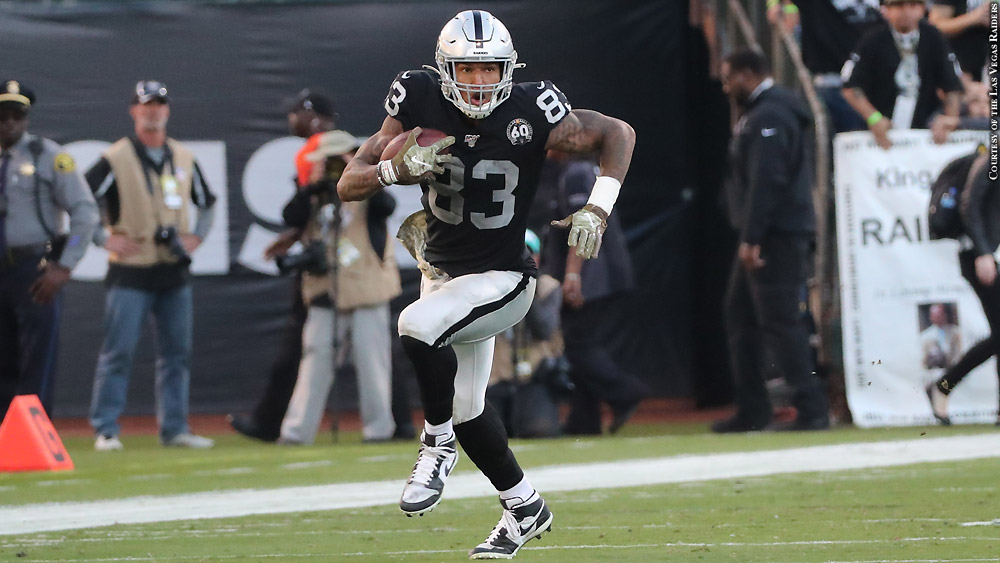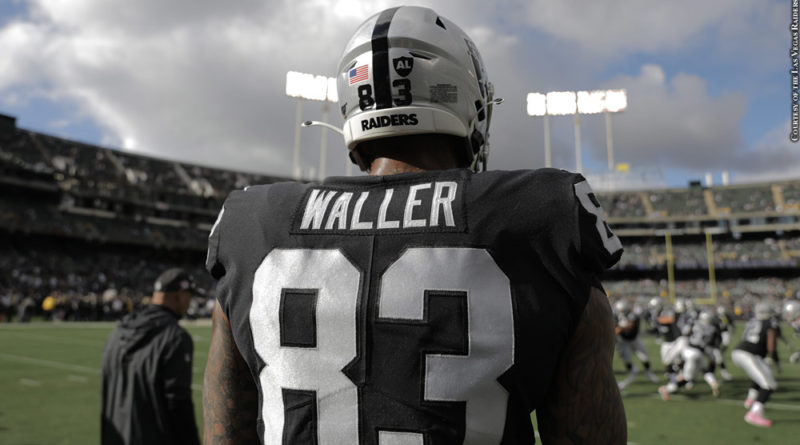In August 2017, then-Ravens tight end Darren Waller was away from the team, serving a yearlong suspension for a violation of the league’s substance abuse policy. His issues were far deeper than that. He was mired in a serious drug addiction.
As he would later describe to HBO’s “Hard Knocks,” Waller was “getting high, literally, every day. Whatever I could get my hands on. Like opiates first, like oxy pills, stuff like that. Xanax, cocaine. Not caring about anything, any kind of consequences or anything like that.”
At the time, football seemed unlikely to be even a part of his life again.
“The first six months of my yearlong suspension I didn’t even wanna go back,” Waller said on Glenn Clark Radio Feb. 18. “I wasn’t even training. I tried training and then I got hurt a little bit while I was training and then it was just like, ‘Forget this.'”
Waller had struggled to find a role during his three seasons in Baltimore, making just 12 total catches from 2015-2016 while battling injuries, an earlier four-game suspension and a move from wide receiver to tight end. But no one around the organization was aware of the far bigger issue the 2015 sixth-round pick faced. Like many addicts, he had worked tediously to make sure no one could possibly discover the full extent of his difficulties.
“I was a master at that, putting on masks and not letting people know what I was going through,” Waller said. “You can ask anyone with the Ravens — it was like when I was in the building I was there, I was respectful, I was quiet and didn’t really attract a lot of attention to myself. They would say I was living two different lives.
“As soon as I left the building I was going to do what I would do and I wasn’t worried about any kind of consequences, anything that could happen to me. None of that was going to make me stop. No one could notice — I didn’t have any relationships with guys on the team, any real friendships. In the building we were cool, I would joke around with anyone, talk with anyone while we were in the building but outside the building I didn’t want to hang around you. Nobody knew what I was doing. They just assumed I was a quiet guy and just did my own thing. Nobody had no idea.”
It’s downright staggering to imagine that just two years after hitting rock bottom, Waller developed into one of the league’s top tight ends, making 90 catches for 1,145 yards with the Raiders last season, missing a Pro Bowl trip only due to offseason thumb surgery.

So how exactly did a man who was mired in addiction and done with the sports altogether turn so suddenly into a player worthy of a four-year, $29.8 million contract extension?
“The last couple years of my life have been just like a really fast acceleration, I guess, once I went to rehab and everything,” Waller said. “I came out and just started living different. It was literally that quick. As soon as I started implementing myself to living an honest life and trying to do things the right way and respect myself, things really started changing. And before I even really wanted to play football again I was just appreciating myself — I didn’t really like myself for a long time — so I started having a newfound respect for myself and that translated over to the football field.”
Not far removed from rock bottom, which included him working 40 hours a week at a Sprouts grocery store in Georgia during his 2017 suspension, Waller made the decision that he wanted to give football another try. But he knew that getting an opportunity was no given.
“I didn’t think any of this would happen,” Waller said. “I didn’t really think I would play again.”
The Ravens released Waller following training camp in 2018 but signed him back to the practice squad. Oddly, that proved to be the catalyst for Waller becoming the player the team had hoped he could become, albeit elsewhere.
“At that point I felt like my skills had really developed just going up against the Ravens’ defense every day,” Waller said. “I just felt like I was more prepared for success because I had been humbled by being on the practice squad and before even playing football again, just working at a grocery store making minimum wage. So things prepared me for success and then it’s like, ‘OK, I could really think I’m somebody now,’ but no, I remember who I was two years ago. I feel like those experiences humbled me and helped me realize that I can’t take myself as seriously as I think I can, but I can just go out there and give it the best of my ability and know that things are bigger than me and just be part of a team and be willing to accept whatever role that is.
“From then on when I took that attitude, my role has just increased. The experience of being on the Ravens’ practice squad and having to stay patient and having to focus on having a positive outlook even though things didn’t look great. It was two-thirds of the way through the season and I didn’t hear one call from a single team but having that practice of staying positive and still approaching Wednesdays and Thursdays during the week like game days kept me locked in as far as getting ready to capitalize on the opportunity.”
The Ravens didn’t have a need at tight end after drafting Mark Andrews and Hayden Hurst in 2018, but opportunity finally came when Waller was signed by the Raiders in November 2018. But his experiences in Baltimore helped shape his breakout campaign and more importantly, the relationships he established in Baltimore helped him maintain his recovery, including one with former offensive lineman turned director of player development Harry Swayne.
“Harry was a big part of [helping me],” Waller said. “[Team clinician] Dr. Tricia Bent-Goodley and Johnny Shelton — the team chaplain — those three were the biggest allies for me. Those were the first people I kind of started opening up to before things really got out of control while I was in Baltimore. I wasn’t completely 100 percent honest with them but that was the first step in the right direction of telling someone what I was dealing with. So those three really helped me through that whole process and never saw me any differently from the bad times to the good times and they’ll still call and check on me and I’ll still have conversations with them. Those three people were really there for me.”
Success on the football field hasn’t changed Waller’s mentality when it comes to recovery. He has taken a spiritual approach that includes prayer, meditation, attending multiple meetings a week, conversations with his original sponsor and others who are in recovery, speaking at recovery centers, journaling and channeling his thoughts artistically as a rapper (“D Wall”).
“Drugs is the symptom of my personality and things that I went through when I was younger,” Waller said. “It’s just trying to make sure I’m not overindulging in other ways in my life just because I’m not using drugs. I can still feel the same amount of guilt when I’m doing other things. It’s just trying to make sure I’m being honest and not manipulating people.”
He’s even offered to help other athletes as they deal with their own addiction issues and wants to help educate others about the misconceptions surrounding addiction.
“I feel like addiction doesn’t discriminate,” Waller said. “It’s not just an image thing. It’s not just someone that’s asleep on the side of the road drunk or high, really out of it. It’s people that are very successful, it’s people that are well groomed, it’s people that are well-spoken. It could be anyone. It could have anyone by the throat. People can put on a great image but you never know what’s going on in their lives.”
He also says that while it’s reasonable to want to help someone who appears to be struggling, they have to be ready to accept that help.
“The Ravens tried to help me plenty and I wasn’t trying to help myself,” Waller said. “Plenty of people tried to help me along the way but I wasn’t ready to help myself. So I would just say it’s not an image thing, it’s not a status thing like once you have a certain amount of money, people can’t tell you anything. There’s people with legit problems that have money, that have success, that have everything that most people think would make them happy or would have no problems in their life. They have more problems than people that don’t have a lot of money. Addiction doesn’t discriminate at all.”
And Waller remains thankful for the time he had in Baltimore and the fans that have continued to wish him well despite his struggles as a Raven.
“I appreciate them supporting me the whole time and believing in me when I didn’t even believe in myself back then,” Waller said. “I wish I could have devoted some of this time that I’ve given to the Raiders, I wish I could have reached that point with the Ravens. It’s sad that can’t happen but I do appreciate my time there. I learned a lot and that time there was time for me to plant the seed and really grow into who I was becoming. I do appreciate the opportunities I was given there and the people that supported me and cheered for me.”
For more from Waller, listen to the full interview here:
Photo Credit: Courtesy of the Las Vegas Raiders

